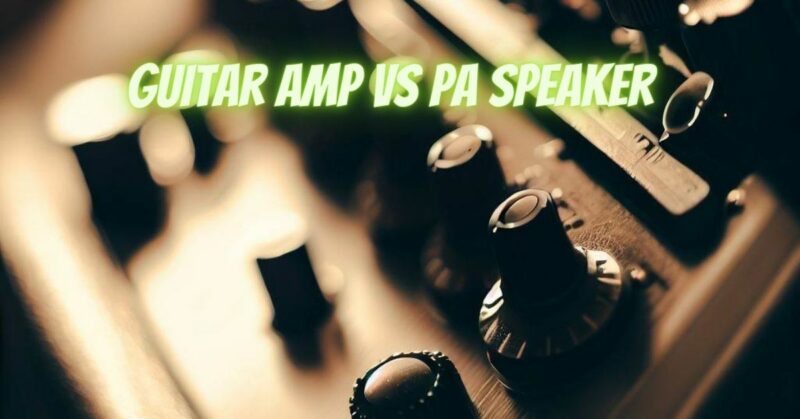When it comes to amplifying sound for musical performances, two common options are guitar amplifiers and PA (Public Address) speakers. Both serve distinct purposes and have unique characteristics. In this article, we’ll explore the differences between guitar amplifiers and PA speakers, helping you understand when and why you might choose one over the other.
Guitar Amplifiers:
Guitar amplifiers, often referred to simply as “amps,” are designed primarily for amplifying electric guitars. They have specific features tailored to guitarists’ needs:
- Tone Shaping: Guitar amps offer tone-shaping controls like equalization (EQ) and gain, allowing guitarists to sculpt their desired sound, from clean tones to distorted or overdriven sounds.
- Speaker Size: Guitar amps come in various sizes, often with speakers ranging from 8 inches to 12 inches in diameter. The speaker size impacts the amp’s overall sound and projection.
- Wattage: Guitar amps have a wide range of wattage options, from small practice amps to powerful stage amplifiers. Higher wattage amps can produce more volume and headroom.
- Effects and Modeling: Some modern guitar amps include built-in effects like reverb, delay, and modulation. Modeling amps can simulate the sound of various amplifier types and speaker cabinets.
- Compact and Portable: Smaller guitar amps are portable and convenient for practice and small gigs.
PA Speakers:
PA speakers, on the other hand, are designed for broader audio reinforcement and can be used with various sound sources, including microphones, instruments, and playback devices:
- Sound Reinforcement: PA speakers are used to amplify sound for live performances, public speaking events, and other situations where sound needs to reach a larger audience.
- Full-Range or Subwoofers: PA systems consist of full-range speakers for mid and high frequencies and subwoofers for deep bass. This setup provides a wide frequency range.
- Multiple Inputs: PA speakers often have multiple inputs for microphones, instruments, and line-level sources. They are versatile for accommodating different sound sources.
- Power and Volume: PA speakers come in various power ratings, from small portable speakers to large, high-powered systems capable of covering large venues.
- Minimal Tone Shaping: PA speakers typically have minimal tone-shaping controls compared to guitar amps. Tone adjustments are usually made at the mixing console.
When to Choose Guitar Amplifiers:
- For Guitarists: Guitar amplifiers are the obvious choice for electric guitarists looking to amplify their instrument. They offer the tone-shaping and distortion characteristics guitarists seek.
- Practice and Small Gigs: Smaller guitar amps are suitable for practice sessions and intimate gigs in smaller venues.
- Sound Character: Guitar amps have a distinct sound character that complements the guitar’s natural tones.
When to Choose PA Speakers:
- Versatility: PA speakers are versatile and can amplify a wide range of sound sources, making them suitable for bands, vocalists, and public speakers.
- Larger Venues: PA speakers and systems are designed to cover larger venues and outdoor settings where greater volume and projection are required.
- Full-Range Sound: For a complete, full-range sound, especially when dealing with vocals and other instruments, PA speakers with subwoofers are ideal.
- Sound Reinforcement: When the primary goal is to reinforce sound for the audience rather than shape the instrument’s tone, PA speakers are the go-to choice.
In summary, the choice between guitar amplifiers and PA speakers depends on your specific needs and the context of your performance. Guitar amplifiers are tailored to guitarists and excel at shaping guitar tones, while PA speakers are versatile and designed for broader audio reinforcement. Understanding the differences and intended uses of these two amplification options will help you make the right choice for your musical endeavors.


